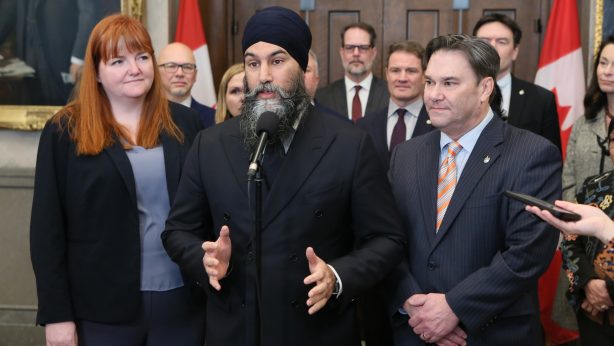Coalition members urge parties to agree on national pharmacare
Federal parties of all political stripes are being urged to commit to finally providing Canadians a national universal pharmacare program.
“We have a unique opportunity now to change this and complete that “unfinished business” of Canadian medicare,” writes Beatrice Bruske, Linda Silas, and Doug Roth.
Beatrice Bruske is president of the Canadian Labour Congress, Doug Roth is the CEO of Heart & Stroke, and Linda Silas is the president of the Canadian Federation of Nurses Unions.
The Canadian Labour Congress and the Canadian Federation of Nurses Unions are members of the Canadian Health Coalition.
Their column also appeared on National Newswatch.
All parties in this pandemic election should agree on one big issue – national pharmacare
By Beatrice Bruske, Doug Roth, and Linda Silas
On August 11th, the federal and Prince Edward Island governments signed an agreement to improve the list of drugs available on PEI public plans and “accelerate work to implement pharmacare.” Islanders will surely benefit. But we need to make sure the final outcome is indeed a universal pharmacare program. This would mean that Canadians would be able to get prescribed medications using their health card, just as we do when we go to the hospital or visit a doctor. It makes sense if we want to thrive and prosper in the post-pandemic recovery.
Today, Canada is the only country in the world with a universal healthcare system that doesn’t include drugs outside hospitals under that “universal” umbrella. This glaring gap has been called “the unfinished business of medicare.”
This is the result of history. In the early 1960s, when the shape of Canada’s future medicare system was being established, drugs were a relative sideshow of the medical system. Doctors and hospitals were king and, of course, resources were limited.
It’s time we changed that.
In fact, it’s far past time. And the opportunity is now.
The value and importance of drugs in our healthcare have risen tremendously in the past 60 years, not just to treat illness and disease but to prevent them. In the cardiovascular field alone, their role has been transformative. They are used routinely to manage high blood pressure – a major risk factor for heart disease and the number one risk factor for stroke – high cholesterol and other conditions. In 2019, Canadian pharmacies dispensed roughly 101 million prescriptions for these types of medicines alone.
This crucial importance of drugs in prevention and treatment extends to almost every other field of medicine, such as infections, diabetes and mental health. When CARP, the Canadian Association of Retired Persons, surveyed its members, it found they take an average of four medications each, with many taking more than 10.
Yet while any Canadian can access hospital or doctor care without worrying about how to pay, we must all concern ourselves with paying for our drugs. Millions of Canadians have insufficient coverage or none at all. While many with full-time jobs have access to private insurance plans and all those over 65 and others have publicly paid drug insurance, almost all plans involve the patient paying a direct share of the costs.
For many Canadians, these costs are such a burden that they avoid taking the medicines they need. A poll from the Angus Reid Institute last October found that one in four Canadian households struggles financially to fill prescriptions. The problem is more acute among women, racialized Canadians, Indigenous people and young people.
Of course, not taking necessary medicines leads to individuals having worse health, causing greater subsequent costs to our healthcare system. Forcing people to pay for drugs, and therefore forcing many to do without them, ends up being a false economy. A universal pharmacare program makes sense for both businesses and the economy as it is estimated it would save Canada roughly $5 billion a year compared to our current fragmented and incomplete system.
We have a unique opportunity now to change this and complete that “unfinished business” of Canadian medicare. The federal government has been committed to creating a national pharmacare program and it has started the process by creating a Canadian Drug Agency to plan how it would work, but with no firm timeline. More recently, a federal advisory panel was struck to inform the development of a national drug formulary. We must continue a quick march forward towards implementing a national pharmacare program.
And, very importantly, it’s something Canadians want. In that same Angus Reid Institute poll, almost nine in 10 Canadians (86%) supported the idea. In a country as large and diverse as Canada, that’s about as close to unanimity as we get on a major public policy issue.
Healthcare delivery, of course, is a provincial jurisdiction. However, the federal government has been creative in recent years in incentivizing provinces to implement policies it considers nationally important. It provided special funding a few years ago for mental health and home care and is now in the process of making agreements with provinces for lower-cost childcare programs. It can and should do the same for pharmacare.
In the wake of the COVID-19 pandemic, access to optimal healthcare is more important than ever for Canadians and there is no optimal healthcare without optimal access to medicines. Every political party should commit in their election platforms to finally providing Canadians a national universal pharmacare program.
Beatrice Bruske is president of the Canadian Labour Congress, Doug Roth is the CEO of Heart & Stroke, and Linda Silas is the president of the Canadian Federation of Nurses Unions.


